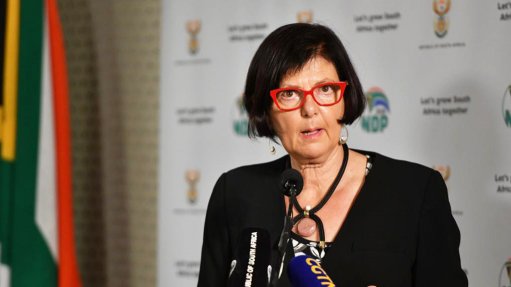
Forestry, Fisheries and the Environment Minister Barbara Creecy
Forestry, Fisheries and the Environment Minister Barbara Creecy has granted Eskom exemption that will enable it to operate temporary stacks at the Kusile power station, in Mpumalanga, for 13 months without using the flue-gas delsuphurisation (FGD) mechanism.
The exemption, which was granted on March 14, has not been extended in terms of the newly published State of Disaster regulations as requested by Eskom, but rather in line with Section 59 of the National Environmental Management: Air Quality Act (NEMAQA), and includes several conditions.
The decision exempted Eskom from what would have otherwise been a lengthy process of amending its Atmospheric Emission Licence and Creecy said it was granted in the interests of alleviating the country’s electricity crisis.
Currently only one of Kusile’s four operating units is in service, after the Unit 1 flue duct collapsed on October 23 due to a build-up of slurry. The collapse also compromised the unit 2 and 3 flue ducts, which share a chimney with the Unit 1 flue.
The three units, which are able to produce 2 160 MW of electricity, have been inoperable ever since, adding about two stages of loadshedding every time Eskom implements rotational cuts.
A full repair of the damaged west stack, in which the three damaged flues are housed, is expected only in December 2024.
“Eskom’s request pertains to a temporary solution to restore lost generation capacity at its Kusile power station while a damaged stack undergoes repairs which are due for completion in December 2024.
“In the interim, Eskom plans to construct the temporary stacks by November 2023, which it anticipates will allow the resumption of generation capacity of 2 100 MW which will reduce the country’s exposure to loadshedding by two levels,” Creecy said in a statement, stressing that she was aware of the well-documented socio-economic impacts of loadshedding.
Eskom would need to apply to the National Air Quality Officer for a one-off postponement of the compliance timeframes for minimum emission standards for new plants.
This one-off postponement of the compliance timeframes for minimum emission standards for new plants would be valid until March 31, 2025.
The exemption granted in terms of Section 59(1) of NEMAQA was subject to the following conditions:
- Eskom must issue a public notice in two national newspapers explaining reasons for the application;
- Eskom must conduct a public participation process subject to a curtailed timeframe of 14 days;
- Eskom must account to Creecy and the Portfolio Committee on Forestry, Fisheries and the Environment in the National Assembly on the progress of its repair to the west stack; and
- Eskom must undertake measures to mitigate against the exposure of its employees and surrounding communities to harm emissions which, at a minimum, must include independent health screenings and referral to appropriate public health facilities for treatment where necessary.
Creecy acknowledged that bypassing the FGD system would likely result in increased sulphur dioxide emissions during the 13-month period and would exceed the current applicable limit contained in Kusile’s Atmospheric Emission Licence.
“I am equally aware of the health and associated impacts of exposure to sulphur dioxide emissions, particularly on communities in close proximity to coal-fired power stations.
“In the light of the competing factors, I have been called on to make an extraordinarily difficult decision,” the Minister said in a statement.
Even before being granted the exemption, Eskom appointed Concor as the main contractor for the temporary stacks, with installation subject to approval by the Minister.
Eskom’s current plan was for the first unit, using temporary stacks, to be returned to service eight months after the environmental exemption was secured, with the second and third units following in one-month intervals thereafter.